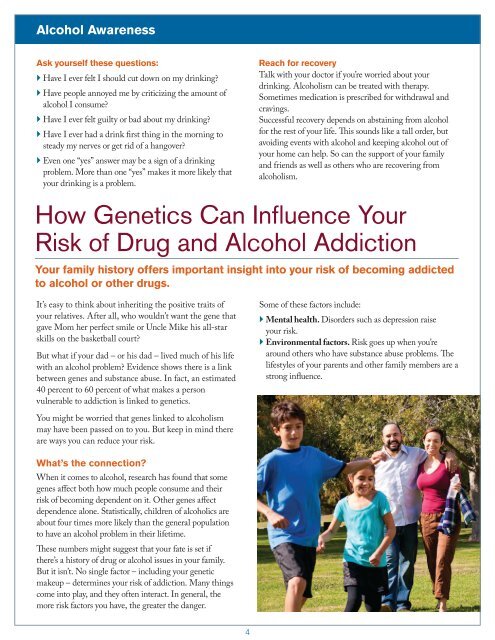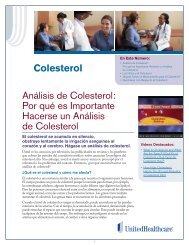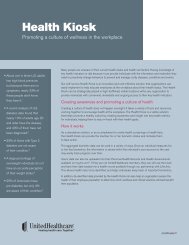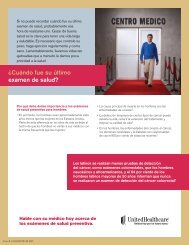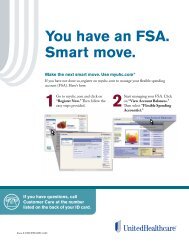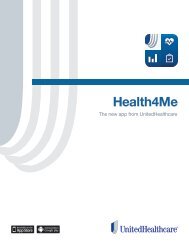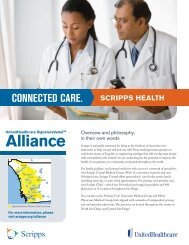Alcohol Awareness newsletter
Alcohol Awareness newsletter
Alcohol Awareness newsletter
You also want an ePaper? Increase the reach of your titles
YUMPU automatically turns print PDFs into web optimized ePapers that Google loves.
<strong>Alcohol</strong> <strong>Awareness</strong><br />
Ask yourself these questions:<br />
} Have I ever felt I should cut down on my drinking?<br />
} Have people annoyed me by criticizing the amount of<br />
alcohol I consume?<br />
} Have I ever felt guilty or bad about my drinking?<br />
} Have I ever had a drink first thing in the morning to<br />
steady my nerves or get rid of a hangover?<br />
} Even one “yes” answer may be a sign of a drinking<br />
problem. More than one “yes” makes it more likely that<br />
your drinking is a problem.<br />
Reach for recovery<br />
Talk with your doctor if you’re worried about your<br />
drinking. <strong>Alcohol</strong>ism can be treated with therapy.<br />
Sometimes medication is prescribed for withdrawal and<br />
cravings.<br />
Successful recovery depends on abstaining from alcohol<br />
for the rest of your life. This sounds like a tall order, but<br />
avoiding events with alcohol and keeping alcohol out of<br />
your home can help. So can the support of your family<br />
and friends as well as others who are recovering from<br />
alcoholism.<br />
How Genetics Can Influence Your<br />
Risk of Drug and <strong>Alcohol</strong> Addiction<br />
Your family history offers important insight into your risk of becoming addicted<br />
to alcohol or other drugs.<br />
It’s easy to think about inheriting the positive traits of<br />
your relatives. After all, who wouldn’t want the gene that<br />
gave Mom her perfect smile or Uncle Mike his all-star<br />
skills on the basketball court?<br />
But what if your dad – or his dad – lived much of his life<br />
with an alcohol problem? Evidence shows there is a link<br />
between genes and substance abuse. In fact, an estimated<br />
40 percent to 60 percent of what makes a person<br />
vulnerable to addiction is linked to genetics.<br />
Some of these factors include:<br />
} Mental health. Disorders such as depression raise<br />
your risk.<br />
} Environmental factors. Risk goes up when you’re<br />
around others who have substance abuse problems. The<br />
lifestyles of your parents and other family members are a<br />
strong influence.<br />
You might be worried that genes linked to alcoholism<br />
may have been passed on to you. But keep in mind there<br />
are ways you can reduce your risk.<br />
What’s the connection?<br />
When it comes to alcohol, research has found that some<br />
genes affect both how much people consume and their<br />
risk of becoming dependent on it. Other genes affect<br />
dependence alone. Statistically, children of alcoholics are<br />
about four times more likely than the general population<br />
to have an alcohol problem in their lifetime.<br />
These numbers might suggest that your fate is set if<br />
there’s a history of drug or alcohol issues in your family.<br />
But it isn’t. No single factor – including your genetic<br />
makeup – determines your risk of addiction. Many things<br />
come into play, and they often interact. In general, the<br />
more risk factors you have, the greater the danger.<br />
4 4


